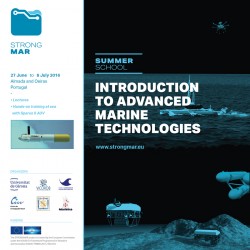Summer School on Introduction to Advanced Marine Technologies
INESC TEC is strongly committed to become a centre of excellence in maritime technology and, in particular, deep sea technology. It is strategically located, with fast access to deep sea, it has been steadily building up its skills, capabilities and resources, and is presently in the process of implementing an open research infrastructure (TEC4SEA), thus preparing itself to become capable of providing services and open access to the European academic and industrial communities and, thus, become a recognized European maritime research asset. The STRONGMAR project aims at creating solid and productive links in the global field of marine science and technology between INESC TEC and established leading research European institutions, capable of enhancing the scientific and technological capacity of INESC TEC and linked institutions, helping raising its staff’s research profile and its recognition as a European maritime research centre of excellence. These objectives will be fulfilled through a set of measures: summer schools, winter schools, short-term scientific meetings, long-term staff visits, networking meetings, workshops, conferences, technology transfer workshops with stakeholders, and other dissemination activities. Therefore, the STRONGMAR project places INESC TEC as the pivot of a network of excellence, involving four European partners which are international leaders in deep sea technology. The STRONGMAR project is coordinated by INESC TEC (Portugal), and the consortium comprises CINTAL (Portugal), the Heriot-Watt University (Scotland, United Kingdom), the NATO Science & Technology Organization (Belgium), the Universitat de Girona (Spain) and the University of Aberdeen (Scotland, United Kingdom). The training strategy is based on sessions touching multidisciplinary aspects, followed by sessions focused on specific fields of expertise, allowing researchers to improve their knowledge and preparing them for the research and implementation challenges in the sea harsh environment. The Summer School on Introduction to Advanced Marine Technologies was organized by our partners of the Universitat de Girona (ViCOROB – Computer Vision and Robotics Research Group and CIRS – Girona Underwater Vision and Robotics) and by the Portuguese Navy (Escola Naval and CINAV). It was held from the 27th of June to the 8th of July 2016, and comprised lectures and hands-on training at sea. The first week programme comprised the following lectures: • “R&D activities at the Portuguese Navy”, Victor Sousa Lobo (Portuguese Navy) • “Knowledge transfer: the story of our underwater technology”, Joseta Roca (University of Girona) • “Underwater Archaeology”, Augusto Alves Salgado (Portuguese Navy) • “Visual and Acoustic Perception with Deep Neural Networks”, Matias Valdenegro (Heriot-Watt University) • “Generic introduction to underwater acoustics / Underwater acoustic sensors”, António Silva (CINTAL) • “Acoustics for underwater sensing”, Paulo Santos (CINTAL) • “Multi-target tracking algorithms and applications”, Daniel Clark (Heriot-Watt University) • “Underwater Acoustics: understanding the environment to increase autonomy”, Yan Pailhas (Heriot-Watt University) • “An introduction to Optical Sensing and Measurement Techniques and their application in the offshore environment”, John Watson (University of Aberdeen) The second week programme comprised hands-on training at sea with the SPARUS II AUV by researchers of the CIRS – Girona Underwater Vision and Robotics, and also field trials of prototypes and new developments from INESC TEC. All the activities were performed on-board a support vessel and had the full collaboration of the Portuguese Navy. The school participants were all students and researchers from the centres for Applied Photonics (CAP), Robotics and Autonomous Systems (CRAS) and Telecommunications and Multimedia (CTM) of INESC TEC. More information at www.strongmar.eu.
Keywords
summer school, training, learning, twinning, technology transfer, R&D, cooperation, underwater technology, robotics, autonomous vehicles, ASV, autonomous surface vehicles, AUV, autonomous underwater vehicles, underwater archaeology, visual perception, acoustic perception, neural networks, acoustics, underwater acoustics, sensing, sensors, acoustic sensors, underwater sensing, multi-target tracking, algorithms, statistics, optical sensing, optical fibres, optical fibre sensing, measurement, data processing, research, development, testing
Countries
Belgium, Spain, Portugal, United Kingdom



